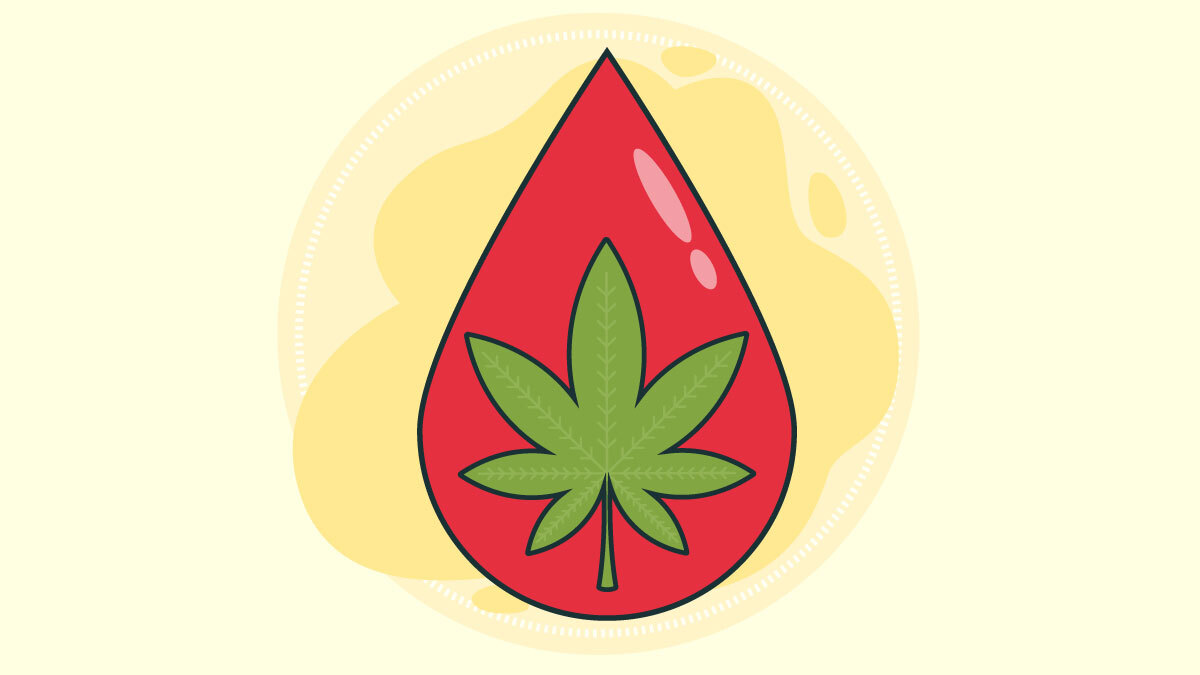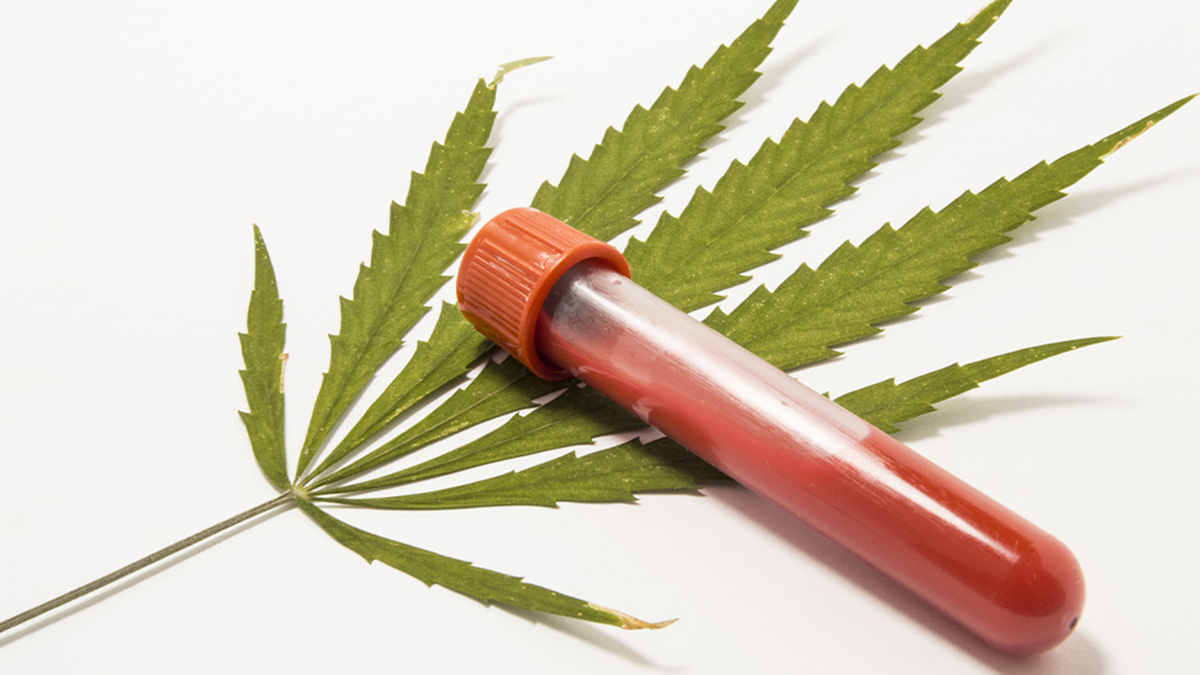Can You Donate Blood if You Smoke Weed?

The Red Cross and major medical centers always need people to donate blood.
There are regularly blood shortages in America, but reserve supplies of blood and platelets have remained at extremely low levels in the wake of the Covid epidemic. And traditional blood drives haven’t done much to ease the shortages.
Before you donate blood, they’ll check your temperature, blood pressure, and pulse, and ask some questions about your health history. They’ll also want to know if you’ve traveled out of the country recently, whether you’ve snorted drugs in the past few months (if the answer is yes, you can’t donate), or ever used IV drugs (that’s a permanent ban on donations).
However, they don’t ask about cannabis, and they don’t test your blood for THC – or any other substance – before they stick you.
So can you donate blood with weed in your system? Usually.
But as we all learned when we were kids and asked our parents a question, “usually” doesn’t always mean “yes.”
What Happens When You Donate Blood
The U.S. Food and Drug Administration (FDA) regulates blood donor eligibility. And the Centers for Disease Control (CDC), not the Red Cross or the hospital, sets screening guidelines for blood donations.
The donor is required to have a “mini-physical.” That means the standard “quickie” tests like blood pressure, and a short interview to determine whether the donor is in good health if they snort or inject drugs if they take any medications that could be an issue, and if they have any communicable or problematic diseases. There’s also a simple finger stick to check the donor’s hemoglobin level, which ensures there’s enough iron in their body.
The actual blood donation takes about 8-10 minutes. After the first needle stick, most people find the rest of the process painless. You have to wait 10-15 minutes before you can leave, to make sure you’re fine – but they give you juice and cookies!
The actual screening of donated blood comes later, and must be done before the blood (or its components) can be used for transfusions. Technicians determine the blood type, and then look for signs of diseases like hepatitis, HIV, syphilis, and West Nile virus; any positive tests will result in the blood being discarded and the donor is notified.
Here’s what they don’t do: they don’t check the blood for any signs of drug use. Even if you’ve smoked up earlier in the day, there’s no THC test that will go tilt.
So if they don’t ask if you’ve used weed, and don’t test your blood for it, what could cause a problem?
What The Red Cross Says About Weed And Donating Blood

The Red Cross and the CDC have a surprisingly modern approach to pot.
Directly from the Red Cross FAQ on blood donation:
Q: Does the Red Cross discourage cannabis consumers from donating blood?
A: No. The Red Cross encourages all eligible donors who feel well to make an appointment to give blood.
The organization goes on to say “The use of cannabis does not disqualify an individual from blood donation…”
Seems pretty straightforward, but you know there has to be another shoe to drop. Don’t worry; it’s not a heavy one.
“…but potential donors cannot give if their use of cannabis impairs their memory or comprehension.”
That makes sense, of course. Any medical procedure, even one as simple as giving blood, requires “informed consent” by the patient. When you’re blasted out of your mind and can’t understand the form you have to sign – or can’t remember your name to sign the form – that would certainly prevent you from giving informed consent.
Who determines if the donor’s memory or comprehension is impaired? It’s up to the medical personnel who do the initial screening. If it appears that the donor is wasted (or drunk), they’ll simply tell them to come back another day. There are no police standing by to take people into custody for attempted DUI, or “donating while impaired.”
What Else Can Disqualify A Potential Blood Donor?
The Red Cross and other medical centers accept blood from almost everyone who’s over the age of 16, as long as it’s been at least 56 days since their last donation.
However, the preliminary health procedures are designed to screen out anyone who could potentially have contaminated blood, or whose health might be endangered by donating.
Some of the people who will probably be turned away:
- Those who are currently ill and have a fever, and those weighing less than 110 pounds. (Those who are shorter than 5’4” may have to weigh more than 110 pounds.)
- Those who are pregnant or have given birth in the past six weeks.
- Those who have had a tattoo or piercing in the past year.
- Those who have had a blood transfusion in the past year.
- Those who have traveled in the last three years to a country where malaria is prevalent.
- Those who have (or in some cases, have had in the past) hepatitis, HIV, Ebola, leukemia, or lymphoma.
- Those who have certain types of blood clotting disorders.
- Those who take blood thinners or a limited number of other prescription medications for conditions like acne, enlarged prostate, or multiple sclerosis.
- Those who have ever used steroids or injectable drugs (legal or illegal) that haven’t been prescribed by a doctor.
- Those who have snorted drugs in the past few months.
That’s a long list, but it basically only excludes those who are extremely underweight, pregnant, regular drug users (not including weed), or those who have recently had a tat or piercing.
One other important fact about blood donation in the pandemic era: you can donate blood if you’ve had COVID-19 and recovered, as long as you’ve been fully recovered for at least 28 days. You can also donate after receiving the Covid vaccine.
Donating blood is more important than ever. Numerous blood drives have been canceled during the pandemic era, and many regular donors have shied away from what they perceive as a greater risk than normal.
In truth, blood donor centers observe all key protocols to ensure the safety of donors and workers, you can’t get Covid from giving blood, and donations are badly needed – even from those with weed in their system. Just be sure you’re not stoned when you show up at the Red Cross.
Can You Donate Blood With Weed In Your System FAQ
Q: Can you donate if you regularly dab instead of smoke?
A: Yes. The screeners don’t distinguish between different ways of cannabis use. There’s only one exception: you can’t give blood if you take Marinol, a prescription medication that contains man-made THC.
Q: Are you prohibited from donating blood if you use synthetic marijuana?
A: Yes, because street substitutes like K2 and Spice can contain chemicals that cause, among other things, severe bleeding. They don’t test for synthetic weed but do ask about it during screening.
Q: If you’re a heavy user and give blood, will a recipient test positive if they have to take a blood test?
A: They won’t, according to the Red Cross.